-
Posts
36399 -
Joined
-
Last visited
-
Days Won
136
Content Type
Profiles
Forums
Blogs
Events
Gallery
Store
Articles
Everything posted by Cecil Lee
-
Dear Anon, Yes, what you had described seems OK. For example, when you stand outside the main door facing into the house, one should not see the dining table. In fact, my home faced this same situation as what you have mentioned:) Warmest Regards, Cecil
-
Dear Marcia, Try to do a SEARCH using the Search feature under this forum. You can find the various alternatives to neutralise a beam. For example, I just did a SEARCH in this forum and the first two searchs show this two links:- 1 Photo Tours of Interest (with Pictures) Another alternative: bamboo flute 9/3/2002 2 Photo Tours of Interest (with Pictures) Another alternative: bamboo flute 9/3/2002 If your beam is made of concrete, the above can show you how to neutralise it. Warmest Regards, Cecil
-
Dear All, 1. This concept is much like the use of a semi-circular floor mat radiating outwards of the house. 2. There is another floor tile concept, which I will share with you later on. But do look at this illustration. 3. In this illustration, imagine, standing at the front door looking outwards. If you have not yet done any renovation to your flooring or perhaps, are considering renovating your floor tiles, you may consider using this profile. 4. This profile - or a semi-circular protusion of your floor tile from the front door is akin to or similar in `protection' afforded by using a semi-circular carpet radiating outwards. 5. In fact, this is advantages if you have thick floor tiles and slight protusion or rounding it helps to afford protection especially if your door faces a long corridor etc... 6. Can this be used in conjuction with other `protections' e.g. semi-radiating carpet? Yes, why not. You can do so - if you want to. This is considered as `white Feng Shui' or good friendly Feng Shui. As opposed to using e.g. a Ba Gua mirror. 7. In fact, there is another method, of configuring the tiles other then this protusion. This will be covered in a later tip. Warmest Regards, Cecil P.S. Despite last month's 7th lunar month (Hungry Ghost), there was much activity for us as we were pretty busy with on-site audits. In fact, this month, under the 8th lunar month, we are much busier than ever! Cheers! Cecil
-
Dear Peck Wun Please see below:- Last month, while doing a house audit, I noticed that my client also stayed at a long corridor. In addition to this, my client's house is also at a long corridor. Please refer to the attached illustration file. In this file you can notice that from inside the house, one can see a neighbour's directional sign (with an arrowhead) slicing thru the main door. This is indeed a threat to my client's house. With such a threat, one has no choice but to use a Ba Gua mirror to neutralise such a threat. Unless, one can speak nicely to the neighbour and hopefully, they take down this threat. Else, one needs to neutralise it. In public housing, unfortunately, it is difficult to request for the removal or reduction of plants along the corridor(s) unless they really pose a nusiance. Or other valid reasons e.g. if the corridor is too narrow for say a disabled using wheel chair etc... As mentioned earlier, if one stands inside the main entrance door facing outwards, and if you can see protrusions or objects that slice thru the main door, this is indeed a threat to the home. There is really not much one can do unless one remove or request to (kindly) remove the threat. You need to fully evaluate whether they are or not threats. Since sometimes, they may seem to be threats but actually not aimed at your house thru the window. Anyway, one can apply the concept: If one can no longer see it; it no longer becomes a threat. Simple solutions include e.g. using day curtains or blinds. Sorry, I am not able to fully visualise what you mean. But, for the main door, one has to be careful about leaks. A leak usually occurs if your main entrance opens directly towards an open area e.g. balcony or window. Where Qi flows in and out directly in a straight line. Warmest Regards, Cecil
-
Dear Anon, Water positions are often determined based on: 1. Shapes and Forms Feng Shui 2. Flying Star Feng Shui where metal elements e.g. #7 or #6 are present In one or both of such situations, a sector may be enhanced with water e.g. water fountain etc... Warmest Regards, Cecil
-
Dear Anon, The placement of the stove should be placed based on several `rulesets' and it differs in each layout. Ideally, under Shapes and Forms Feng Shui, it is good to have the stove face inwards of the main door. On landed property, it can still be on a side wall (to maximize the layout plan of a kitchen). Besides this, other `rulesets' apply:- 1. Where possible, the stove should not face a toilet door 2. It should not be placed with an open window. The wall behind the stove should have a solid backing. 3. where possible (especially if the stove is located at the North compass direction) of the house, it should not face a water position direction (or in line with it). 4. Commonsense approach (Egronomics) in the placement of a stove vs wash basin:- Please look at the attached illustration:- For safety reasons (not so much of Feng Shui); the wash basin should preferably be positioned such that after cooking eg. hot utensils can immediately using body motion to swing it towards the stove area to the wash basin. With just a side movement of the body. This is much preferred over having the wash basin behind you. If so, and if one have small children, one may have to look carefully first (carrying the hot utensil) and bringing it from the stove area, towards the wash basin. This is akin like looking left, right or down to see if anyone is around before bringing the hot utensil to the wash basin. Usually, under Feng Shui, there are some Feng Shui practitioners who believe that the stove should favour the elements of the breadwinner. Some believe that it should instead favour that of the spouse (wife). While some other Feng Shui practitioners feel that this should be a bad location as it helps to burn away `inasupiciousness'. Whatever, it is, the concept behind the importance of the stove is that it is considered important as this is the place or that the warmth of the house. Nowadays, it has to be placed based on many considerations and also safety aspect as mentioned under the illustration. Usually, the placement of the stove is also limietd by the fact that especially apartment buildings have small kitchens. And other limitations include the entrance to the kitchen, the wall opening or window (usually for wash basin) and the passageway to the utility or back area of the house. Warmest Regards, Cecil
-
Dear Melissa, 1. Many people would encounter the same problem that you have faced. Especially if one partner is an East House while the other is a West House person. 2. If one is currently finding a new house, then look at the intangible force affecting each spouse at the main entrance and their bedroom. Go for smoother combinations e.g.: Prosperity vs Irritation or other such combinations as opposed to combinations such as: Longevity vs death or disaster. Under Ba Zi Feng Shui, one should consider `binding elements' or elements that can help bind both partners. For example, Strong Metal person vs Weak Earth person, one should use a binding element e.g. Fire element. Warmest Regards, Cecil
-
Dear Anon, When planting plants or trees avoid having the tree trunk slicing into the house. If so, it may become a threat. In all my audit rounds, if the bedrooms are at the west and affected by direct sunlight, the interior layout especially the position of the bed and even the study table should be carefully looked at both from Feng Shui and commonsense approach. Locally, it can be quite hot especially if the bedroom is in direct contact of the sun eg. west. And it is the brickwall, one can even (if one places one's hand) next to this wall, feel the heat as much as 3 or more hours after sunset. Thus, if one were to place a bed parallel to the wall, the person sleeping here may feel uncomfortable or require to turn on the aircon. Similarly, it is not prudent to place the study table with the occupant facing direct sunlight. The study table should be positioned such that one's back faces away from the light. Warmest Regards, Cecil
-
-
This second house also have bad Feng Shui. In the next installment we will understand the rationale why this house also has `similar' bad Feng Shui as the earlier case study of: House with poor Feng Shui. One of the pictures clearly also show the house remaining vacant. Most probably, the owner is plagued with financial problem. Please see attached...
-
The wealth of the house with bad Feng Shui is run-off to the house at the lower end. The house at the lower-end places its mouth or main gate to receive automatic wealth at the expense of the house with poor Feng Shui. You will find that the house with bad Feng Shui has been left vacant. Mostly due to financial problems - whilst staying in the house. Please see more pictures. Warmest Regards Cecil
-
This second installment provides more pictures in understanding the situation: 1. From the side view pictures, one will notice two distintive problems:- 1.1 Besides the different or non-uniform roof, one can see the side windows. These windows are slanting much like the hull of a ship. This shape is inauspicious as it is symbolic of a boat abeit a SINKING SHIP. 1.2 Instead of the metal mesh fence, this side of the slope could do with a brick wall (much like the frontage of the house). Please look at the various photos. Comments will continue under the next installment. Warmest Regards, Cecil
-
Introduction: Type of House: Single unit (Bungalow) - Landed Property This introduction page focus on the distintive bad Feng Shui of the house. Please take a look at this first picture. You will notice that:- 1. The roof is unbalanced because one side is higher than the other side. 2. Look carefully at the picture. You will find that the land on which the house sits on is sloping. Although this can be `cured' by Feng Shui e.g. use of a water position. It has not been done. 3. On a later second installment, you will be introduced to two more problems relating to the bad Feng Shui of this house. Warmest Regards, Cecil
-
Nowadays, it is quite rare to find the Yearly Chinese Alamac or Tung Shu placed above the main door of Chinese homes. Traditionally, some Chinese would purchase a new Tung Shu (Yearly Chinese Alamac) and place a new copy of it every new year. It is said that this is to ward off evil and provide good luck. To understand what I mean, I have chanced upon an apartment....
-
Dear Gordon, In my opinion, I have seen yin and yang symbol tattooed before on a body. Basically, there should not be any issue with it being tattooed other than on e.g. private parts or locations like battock or the bottom of the feet. Should therefore, tattooed in appropriate locations e.g. arm ... The yin and yang symbol is in total, comprise a wide field much like the Swastica symbol used by Buddhist on Buddha. (Unfortunately, the Germany Nazi SS copied and used this symbol also). Therefore, the yin-yang symbol unlike the Ba Gua symbol as shown under the url: http://www.geomancy.net/resources/art/art-pakua.htm In particular, the First Heaven Sequence Ba Gua trigram should not instead be tatooed. Warmest Regards, Cecil
-
Dear Anon, 1. Thanks for your sketch of your plot of land. 2. Overall, your plot is not a `worst case' senario. Frankly, it is quite common to find such a layout plan. And in many situations, there should not be an issue here. Provided, here is no canal or large drain at the back of the house. Planting trees behind the house is a consideration. 3. Another approach done is shown in a rough sketch - attached to this message. It shows a semi-circular profile radiating outwards of the house. 4. First of all, this may not be applicable to most houses as it implies e.g. planting trees in a semi-arch along the `yellow' boundary of the house. Impratical as it may sound (because we need to take care of the garage e.t.c) the is a Shapes and Form method of `compensating' for a narrow front. If the building itself looks like your plot of land, then e.g. the front door area or floor can have this semi-circular e.g. carpte tiles radiating much like that in the attached illustration. Warmest Regards, Cecil
-
Dear David, When we look at water positions in a house, we should look at it from two view points:- 1. Is it beneficial to the home e.g. under Shapes and Forms Feng Shui? 2. Your Ba Zi element. Since your Ba Zi element is `weak fire' element, it is best to avoid placing a water position (inside) the house. But you can still place a water position - outside the house. For example, if you have a balcony, and if after an audit it is found that you can benefit from a water position, then we say that based on Shapes and Forms Feng Shui, water can benefit you (Your Home). Therefore, in your situation, when it comes to the interior of the home, it is less beneficial or can even be `threating' to have a water position within your home. 3. From my personal experience, i.e. colours e.g. wearing green:- 3.1 So far, the major influence in our life will still be e.g. the Feng Shui of a home. And sometimes, we read life threating cases. For example, a bad Feng Shui house can even lead to calamity. 3.2 The next thing we look at under the Ba Zi is one's Luck Pillars or the current 10 year luck period. Here, if the season does not favour one's element, then, one should use more of one's favourable element both in the home and personal self e.g. dressing. 4. What happens if I am staying in an existing home without progress? In a Feng Shui assessment or audit, a person's and family members Ba Zi is analysed together with the home Feng Shui. For example, if the Ba Zi e.g. of the breadwinner is inauspicious under the current 10 year luck period plus, the home Feng Shui is poor, then both are considered pulling down one's luck. However, if the Ba Zi looks OK, but the home Feng Shui is poor, then the chief culprit is the home Feng Shui. And appropriate action should be taken to FIX-THE-LEAK and at the same time, make enhancements. The aim here is to bring up the total luck for the person. Warmest Regards, Cecil
-
Dear Anon, Generally, death by natural causes will not be an issue. As the imprint is usually, momentary. You can cleanse the shop by throwing salt and rice into the various sectors of the shop. Is it best to choose an auspicious date for construction and later, move-in. ? Across Usually, this should not be an issue since, your side of the road is away from it. Warmest Regards, Cecil
-
Dear Wasis, Here are some important points with regards to a pair of lions:- 1. Usually Feng Shui practitioners advise the use of lions - if it is for the home, at an inauspicious sector of the house. 2. Where possible the lions should face outwards of the house. 3. Lions placed in the house should not look too fierce or ferocious. They should look `peaceful' and happy. If they look fierce. They must never have their mouths face inside of the house. 4. Lions are used for:- 4.1 Either to ward off evil and /or 4.2 to bring in good luck into the house. 5. The common form of a pair of lions are made of stone. While those made of wood as what you have are often seen on roofs on beams e.g. front door or below i.e. supporting a wooden business signboard (painted in gold). 6. For your placement, it is best not to elevate the two lions. You can still use the two wooden lions, but place them on the lowest shelf. Please refer to above. It is correct to place the female on the right. While the male on the left. The preferred lion to use is made of stone. Best not to place these pair of ceramic figurines at the frontage of the house. Instead, move the two lions down to `earth' or at this location. If the object is solid, you can use it symbolically to activate the mountain star. Warmest Regards, Cecil
-
Dear Anon, Please see below:- Plants is ok. For 6-coins, generally, it has to be seen. Not hidden. Water on it's on holds no value Warmest Regards, Cecil
-
Dear Guek Rian, 1. Please note that one should consider: 1.1. Where is the frontage of the house. 1.2. Where is the sitting or back of the house. 2. Water Star(s) should be activated at the frontage of the house or a building. 3. In a tiny bedroom, there is really not much effect of activating water stars. The commonsense approach is that the most effective activation of water stars is e.g. the use of water position e.g. like a Ming Tang or Bright Hall where there is a water position at the frontage of the house. 4. Thus, one is most likely to swallow a sugar coated pill if someone can convience us that a water position can or should be activated in a bedroom. 5. However, if the bedroom happens to be at the back of the house e.g. such as on the same wall as the backdoor, then perhaps mountain star can be activated here. We cannot therefore squeeze out more than what the theory cannot provide. Warmest Regards, Cecil
-
Dear Guek Rian, Please see below:- In Feng Shui especially in Hong Kong, one can find a shape of a mountain (deplicting) a mountain star. If your crystals can be inverted and looks somewhat like the illustration below, then, it may be used as a mountain star. However, as shown in the diagram, the mountain star is usually `earth' colour and if your crystal matches this then, it seems OK. (Please see attached picture) Where possible, water star should be activated in a clear space location e.g. living room. In the bedroom, if this bedroom happens e.g. to be at the `back' of the house and if there is a wall, if a mountain star is found, a mountain star can be activated here. Warmest Regards, Cecil
-
Dear LaSonya, Thank you for the scanned image of your home layout plan. Based on Shapes and Forms Feng Shui, the layout as shown in the scanned image is still the best position for both of your bedrooms. As this is based on good shapes and Form Feng Shui. It is not practical to shift the bed over to the door side - as it will no longer be good under Shapes and Forms Feng Shui even if the current location may not be auspicious. Warmest Regards, Cecil
-
Dear Miriam, Yes, one of these alternatives is meant to "neutralise" the beam. Even under current situation (without a neutralsing agent); it is felt that one must be underneath the beam for more than 2hours per day per year to have any effects. Warmest Regards, Cecil
-
Dear All, 1. Recently, I have encountered cases perhaps one may all it a coincidence, of bad luck especially moving into the house during the 7th month. 2. These new clients faced difficulties pr bad luck during this period. 3. For the Chinese, if you had encountered such situations, make sure that you may have to burn incense and `gold paper' and offer fruits before the 7th month ends. 4. Usually, during the 7th month, offerings such as mentioned above are offered on the 1st day of the 7th lunar month, the 15th day and the last day of the lunar month. But for those who have a spate of bad luck, should make an offering now and on the last day of the lunar month i.e. which is on the 6th September 2002. 5. Another common practise is to purchase: 5.1 flowers e.g. rose petals 5.2 lime Cut the `lime' into two and place the flowers and lime into a small receptacle or small basin. After you had finished bathing, hold the basin with your hands and pour the water with the flowers and rose petals over (on top of) your head. Just pick up them up and throw them away into the dustbin. This is suppose to break away bad luck. Warmest Regards, Cecil
Forecast
Free Reports
Useful Handbooks Guides
Feng Shui
- Feng Shui Resources
- Fun with Feng Shui
- Photo & Pictures
- Encylopedia of Feng Shui
- Singapore Property Review
Chinese Horoscope
Palmistry
Feng Shui Consultation
Services
Order & Download Forms
Main Navigation
Search




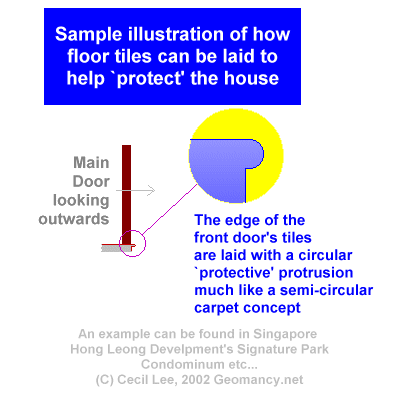
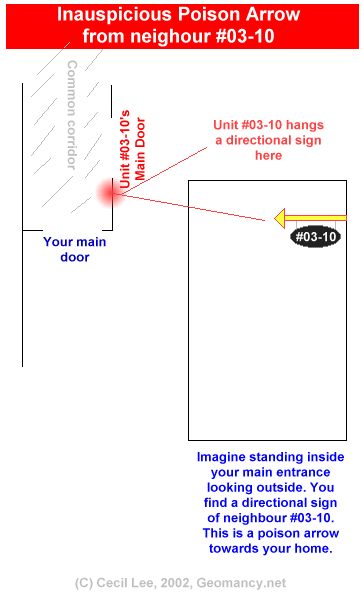
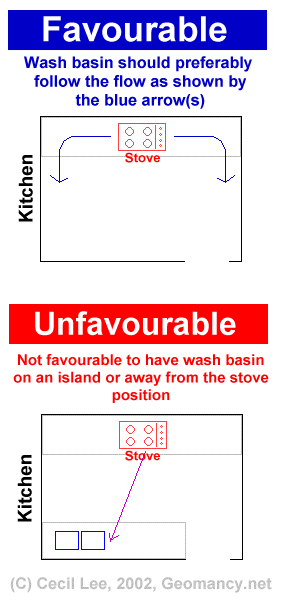
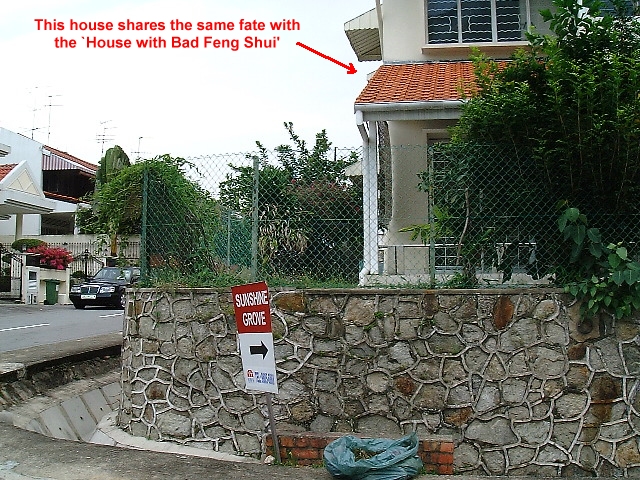
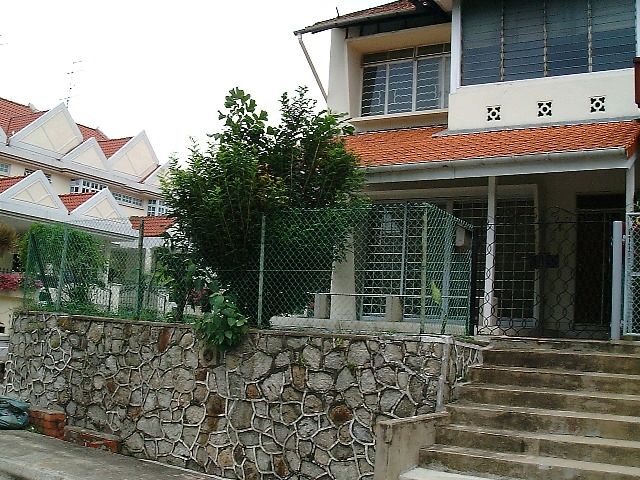
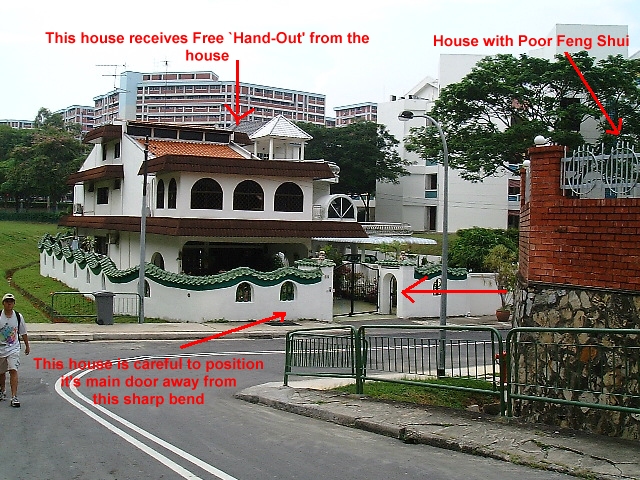

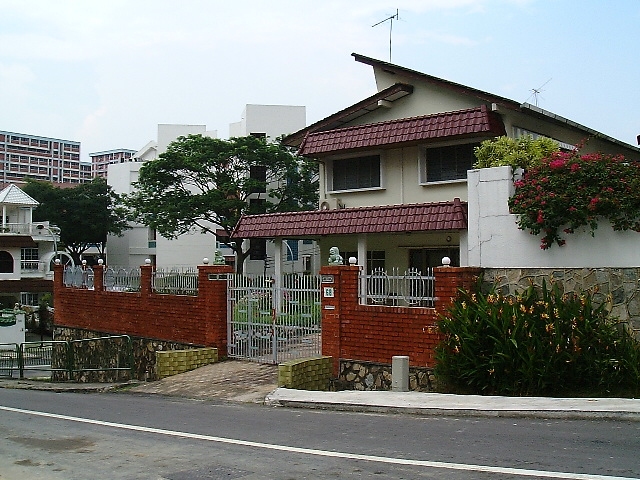


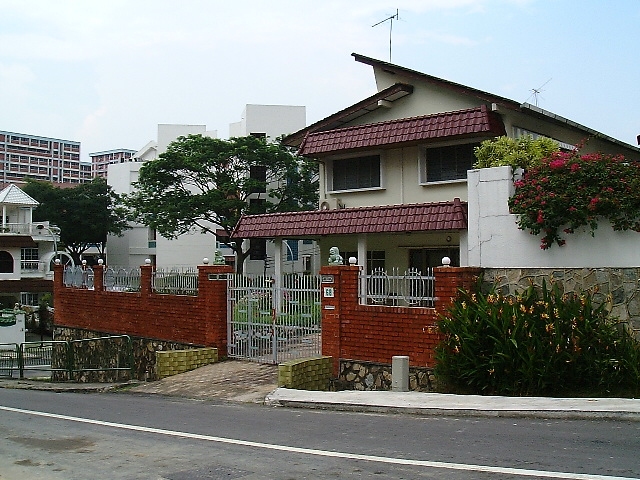

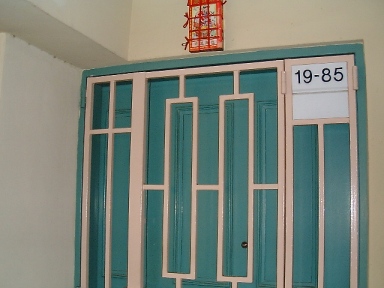
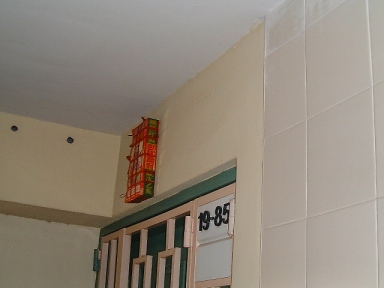
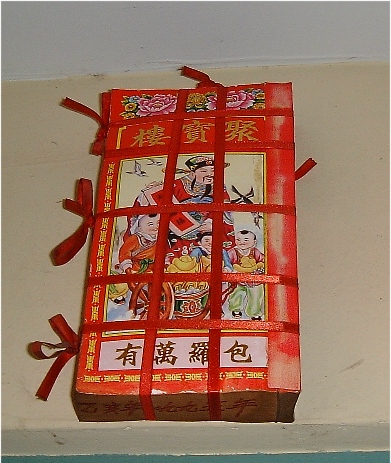
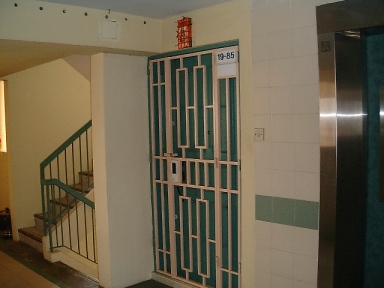
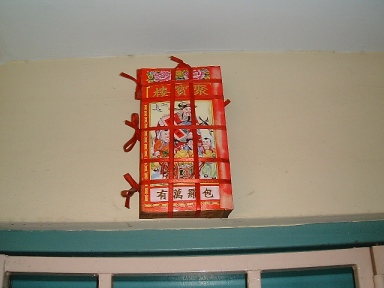
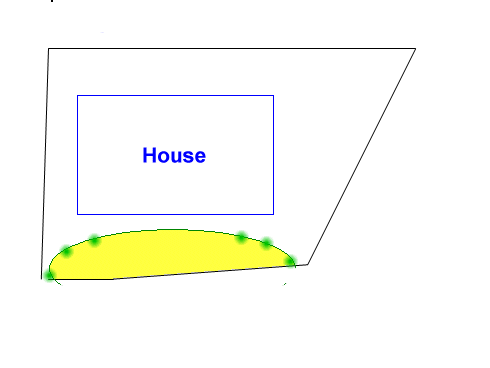
.gif.4ea9c1a9370a4fc8ed940add43eeef89.gif)